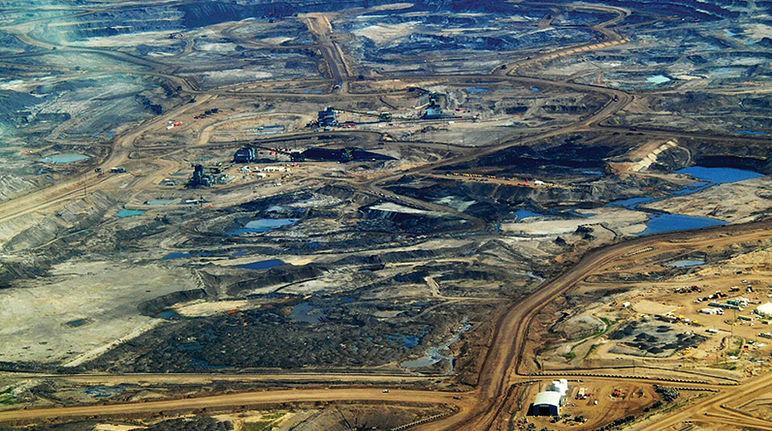Stop deforestation for tar sand oil: Say no to CETA
 The apocalypse, Canadian style: the extraction of oil from tar sand is destroying huge swathes of land (photo: Flickr/Dru Oja Jay - CC BY 2.0) (© Flickr/Dru Oja Jay - (CC BY 2.0))
The apocalypse, Canadian style: the extraction of oil from tar sand is destroying huge swathes of land (photo: Flickr/Dru Oja Jay - CC BY 2.0) (© Flickr/Dru Oja Jay - (CC BY 2.0))
Vast swathes of land are being devastated and rivers polluted for Canadian tar sand crude – the world’s dirtiest oil. While tar sand oil is currently banned in the EU, the oil industry will force open Europe’s door if the CETA trade agreement is ratified. Speak out against CETA!
Call to actionTo: German Chancellor Angela Merkel; Minister for Economic Affairs and Energy Sigmar Gabriel; Minister for the Environment, Nature Conservation and Nuclear Safety Barbara Hendricks
“Reject the CETA agreement with Canada that would open the door for the sale of tar-sand oil in Europe.”
Tar sand mining leaves a trail of destruction: the boreal forests and wetlands of Alberta, Canada, once home to 600 plant and 300 animal species, are giving way to a post-apocalyptic landscape of strip mines. Mining has polluted the Athabasca River, and the people of the indigenous Mikisew Cree First Nation downstream are suffering from dramatically elevated cancer rates.
Canada’s tar sands constitute the second largest oil reserves in the world. While the amount currently reaching Europe is negligible, if all goes according to the oil industry’s plans, it will be 700,000 barrels a day by 2020. The impact on the climate would be significant, as tar sand oil releases 23 percent more greenhouse gases than conventionally extracted oil.
CETA: corporations can sue governments
If ratified, CETA – the “Comprehensive Economic and Trade Agreement” between the EU and Canada – would open the door for the import of tar sand oil into Europe. Under the agreement, corporations will be able to sue governments over environmental laws that could hamper their business. At present, the EU Fuel Quality Directive is keeping tar sand oil out of Europe. The EU had drafted an amendment to the directive with tighter standards, but shelved it in 2011, fearing lawsuits from oil companies under CETA over billions in lost profits.
If this unprecedented corporate power grab is ratified, CEOs of Monsanto, Shell and other multinationals will be breaking out the champagne: bans on genetically modified crops and fracking would no longer be tenable. CETA would also open the door for the TTIP trade agreement with the United States.
The race to ratify CETA is now on, but resistance is stirring in Germany. A German 'no' is the key to stopping CETA throughout Europe. Please call on the German government not to sign the agreement.
BackgroundCanada’s tar sand deposits underlie more than 140,000 square kilometers of northeastern Alberta – an area larger than England. The country’s oil reserves are estimated at 170 billion barrels, putting it in second place after Saudi Arabia.
Currently, Canada produces 2.8 million barrels of crude oil a day, 1.5 million of which come from tar sands. Current plans are to boost production to 4.7 million barrels a day by 2025, with 3.7 million from tar sands.
So far, exports to the EU have been insignificant, but sales are slated to increase from the current 4,000 to 700,000 barrels a day by 2020. That would run counter to the EU’s climate protection policy: Replacing conventionally extracted oil with tar sand oil would result in additional carbon emissions equal to adding 6,000,000 cars to Europe’s streets.
Three tons of sand for only one barrel of oil
Tar sand is often called “oil sand”. This is misleading, however. A complex chemical process is required to extract oil from the bitumen in the sand. Two to three tons of sand are needed to obtain just one barrel of oil (159 liters). Processing the sand consumes up to five times more energy than the extraction of conventional oil. The fuel also emits 23 percent more greenhouse gases.
Strip mining tar sand not only devastates vast swathes of land, it also causes serious water pollution on a large scale. The contents of the tailing ponds, which presently cover 176 square kilometers, could bury London under a layer of toxic sludge nearly one meter deep. The muck contains heavy metals such as lead, mercury and arsenic, as well as carcinogenic polycyclic aromatic hydrocarbons. A study by the University of Toronto has shown that up to 1,000 times more toxins evaporate from the ponds than previously assumed. According to the Pembina Institute, 11 million liters of the toxic brew seep into the groundwater and pollute the Athabasca River every single day.
Athabasca River polluted
Fish in the Athabasca river and delta show striking deformations. Among the indigenous Mikisew Cree First Nation living downstream, certain cancers occur at up to seven times the national average rate. Locals in the village of Fort Chipewyan put the numerous deaths down to heavy metals in the environment. The Canadian government does not see a connection. Critics have described the government’s cavalier attitude toward the plight of the indigenous peoples as racist.
The United States has been the main consumer of Canadian oil, but demand is falling. The U.S. is pushing the extraction of oil and gas using fracking technology with the aim of becoming independent of foreign oil, so Canada is now looking for new buyers. Prime Minister Stephen Harper has already been on a promotional tour of Europe. The Ukraine crisis and the new ice age in relations to Russia are likely to play into the hands of the Canadians.
Oil pipelines crossing the continent
Canada is planning major pipelines to transport the crude oil. The Enbridge pipeline across the Rocky Mountains to the Pacific has already been approved. The planned 2,700 km Keystone XL pipeline would link Canada to refineries in Texas. U.S. President Barack Obama has yet to authorize its construction, however.
To: German Chancellor Angela Merkel; Minister for Economic Affairs and Energy Sigmar Gabriel; Minister for the Environment, Nature Conservation and Nuclear Safety Barbara Hendricks
Dear Chancellor Merkel, dear Minister Gabriel, dear Minister Hendricks,
Canada’s tar sands are by far the dirtiest source of oil. Vast boreal forests are being cleared and wetlands drained for the strip mines, and extracting the oil requires considerable amounts of water and energy. Tar sand oil’s carbon footprint is significantly worse than that of conventional oil.
At present, the EU Fuel Quality Directive bans the import of tar sand oil. That will change with the Comprehensive Economic and Trade Agreement (CETA) being negotiated with Canada. CETA would give multinational corporations unprecedented power to sue governments and undermine effective environmental and climate policy. CETA will not only open Europe’s door for tar sand oil, but also for genetically modified crops and fracking.
Please do not sign CETA. Thank you.













 Recent successes
Recent successes